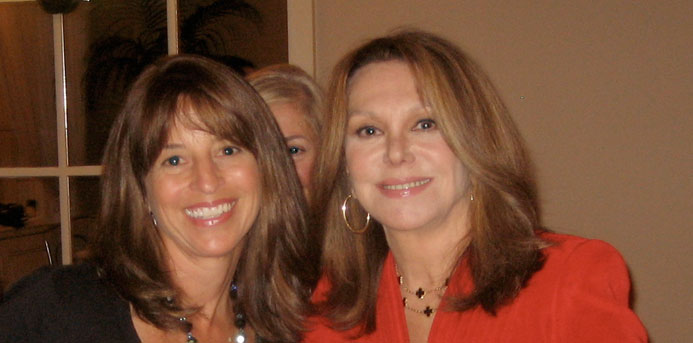Marlo Thomas’ book, “Growing Up Laughing – My Story and the Story of Funny,” is more than a memoir.
Her story about growing up the daughter of famed comedian Danny Thomas, in a household that was constantly filled with showbiz greats, is mixed with hilarious jokes and interviews with today’s biggest comedians. Last week the groundbreaking actress, author and activist visited Chicago and I had the chance to talk to her about her book, her career, and her years living in the northern suburbs.
What made you decide to share your book with interviews from all these great comedians?
I really wanted to do a funny book. I was writing about how I developed my sense of humor, my sense of timing, and my love of the craft of comedy, and I thought that my dad didn’t have the benefit of my childhood. I grew up with my father and his friends—Bob Hope, Milton Berle, Sid Ceasar and George Burns. My father’s childhood was kind of grim, but he had this one funny person in his life, his Uncle Tony, who gave him the gift of laughter. When I realized that, I became really interested in other comedians. How did Jerry Seinfeld get funny? Did Joan Rivers have somebody funny in her life?
Your father didn’t want you to go into show business.
He was afraid. He didn’t know whether lightning would strike twice in the same family and he wasn’t sure if his children would be tough enough to take it.
Did you face a lot of rejection?
Absolutely. When I first started, I was always cast as a Hawaiian or a Mid-Eastern person, never the girl next door because I wasn’t blonde. But the minute I did That Girl, I became the girl next door. That’s how fickle it all is.
“That Girl” was the first show on television about a single woman living on her own, and it was your idea, right?
They brought me ideas for a show and I said, “All these shows are where the girl is the daughter of somebody, or the wife of somebody or the secretary of somebody. How about a show where the girl is the somebody?”
Did you have to fight to keep your character, Ann Marie, single?
They wanted her to get married on the last episode. I thought that would be a betrayal to all the young girls who saw me as the alternate to their mothers and aunts—to say marriage is the only happy ending there is. Instead on the last show I took Donald to a woman’s liberation meeting.
Eventually you did get married, to Phil Donahue, and you moved into his house in Winnetka with his four boys. What was that like?
It was pretty much like living in a frat house. It would be a shock for any woman and it was challenging. But I learned a lot. I’m not a person who is presumptuous. I learned that you don’t become a stepparent overnight. You’re a stranger first, then you have to become a friend, and then you can become a stepparent.
What are your fondest memories about living in the northern suburbs?
We lived on the corner of Pine and Ardsley from 1980 to 1985 and it’s a great neighborhood. We’ve remained friends with a lot of the people who lived on that street—in fact we’re having dinner with some of them tonight. We also spent a lot of time in the city, there’s so much culture here. But any place is really about the friends you make.
You have this book, an upcoming Broadway play, your work at St. Jude Children’s Research Hospital, and your new website, marlothomas.com. What advice would you give to women about getting older?
I say this on my website: I haven’t stopped dreaming. You’ve got to plan for your next dream, your next dream, and your next dream. We could live to be 120 nowadays. Keep your body fit, run, exercise, eat well. I do. I take care of myself. You have to! As George Burns used to say, “I can’t die yet, I’m booked!”

Growing Up Laughing: My Story and the Story of Funny
Marlo Thomas
Hyperion, $15 at amazon.com

